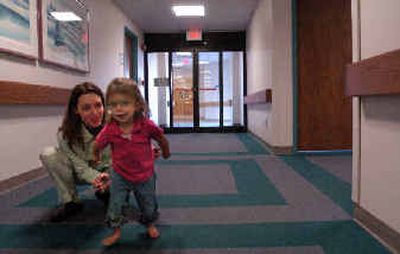St. Luke’s to close children’s program

Three-year-old Phoebe Rux and hundreds of other disabled children are caught in the middle of a fight between St. Luke’s Rehabilitation Institute and the state.
On one side, the Spokane rehabilitation hospital says it will have to close its outpatient children’s program next year because of a cut in state funding for kids covered by Medicaid.
On the other side, the state Department of Social and Health Services says that St. Luke’s was getting an unwritten special deal that gave it more money for the same services than other rehab centers in the state. The deal, which violated the state’s rules, ended at the beginning of this year.
Phoebe’s parents know only that if St. Luke’s closes its program, they’ll have to find another place that can offer physical, occupational and speech therapy to Phoebe and her 5-year-old sister, Abby.
“It would be a real struggle for us to find places that have openings,” said Colbert resident Tanya Rux, the girls’ mother.
Both children have developmental delays. At St. Luke’s, Phoebe is learning to jump and to stand on one foot, skills that will build strength and give her more independence, so eventually she can get out of diapers and learn to dress herself.
“Abby only this summer became able to dress herself,” Tanya Rux said. The girls are adopted. Troy Rux, a math teacher, and Tanya Rux, a homemaker, have fostered and adopted other children. They now have six children, three of whom are adopted.
More than half the 600 children who get therapy at St. Luke’s are insured by state Medicaid programs. The Rux family gets partial funding for the St. Luke’s therapy from Medicaid.
When the payment formula changed at the beginning of the year, St. Luke’s administrators decided to try to live with the new rates. From January through June, St. Luke’s was short $250,000 it would have received under the old agreement, said Gary Smith, St. Luke’s chief operating officer.
That wasn’t sustainable, Smith said. So St. Luke’s plans to stop taking new patients on Dec. 31 and close the pediatric outpatient program on June 30, Smith said. Fifteen staff members would be laid off.
St. Luke’s administrators say that the Medical Assistance Administration division of DSHS performed a detailed analysis in 2001 that led to the prior payment arrangement. But neither St. Luke’s nor the state can find a written record of the analysis.
St. Luke’s is asking for more than the going rate for the services it provides, said Doug Porter, assistant secretary for the Medical Assistance Administration division.
“They had cut a separate deal to get paid differently than any other hospital,” Porter said. “The (DSHS) system had been hard-coded to pay them their charges where everybody else got paid on a fee schedule. When a St. Luke’s bill came in and when a (Seattle) Children’s Hospital came in, they got paid differently.”
The agreement with St. Luke’s was a sloppy business practice, one of many that earned a bad name for the Medicaid program among lawmakers, Porter said. When Porter started at the Medical Assistance Administration about three years ago, he said, he was asked by DSHS Secretary Dennis Braddock to restore fiscal responsibility to the Medicaid program.
“We were in violation of our own rules,” Porter said. “I put (St. Luke’s) on notice that we were cleaning this up.”
All that is worlds away for the Rux children and their St. Luke’s physical therapist, Karen Armstrong. For them, life is about milestones like learning to use scissors. Abby, the older girl, cut out a circle last week, Tanya Rux said, “and everyone knew it was a circle.”